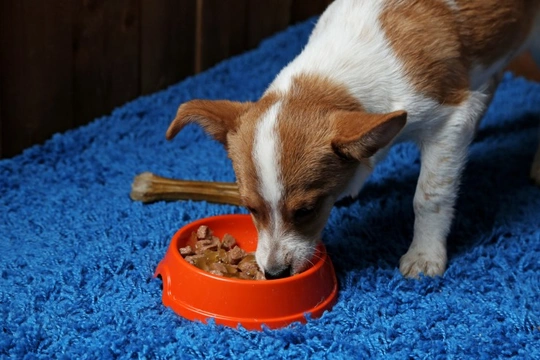
Best Dog Food for Colitis: Diet and Feeding Tips
Colitis is an inflammatory condition of the colon, which can affect both people and other animals such as dogs. It is a digestive disorder that can either be acute in nature, meaning that it will flare up suddenly from time to time with interim periods of normality, or it may be chronic, which means that it develops more slowly and is present most of the time.
Colitis tends to be uncomfortable and painful for affected dogs, as well as leading to a range of digestive upsets such as diarrhoea. Over time, it can also lead to the development of IBS or irritable bowel syndrome, and can flare up for a whole host of reasons, including stress or dietary imbalances.
One of the main ways of managing colitis on an ongoing basis, including keeping the dog comfortable and reducing the incidence rate of flare ups is by means of the dog’s diet, and finding the right food type and quantity for an affected dog can help to address the condition and help with its management.
In this article, we will look at the right sort of diet and feeding regime for a dog with colitis in more detail. Read on to learn more.
Colitis and food
Colitis will tend to flare up or worsen when the dog eats something that their body does not fully process, and this can mean scraps or foraged food that simply do not agree with them, or ingredients within their normal, complete dog food itself.
A wide range of compounds and ingredients in mainstream commercial dog diets can lead to a flare up of colitis, including colourings, preservatives and flavourings that can vary considerably from brand to brand.
It is important to work with your vet when deciding upon a diet for a dog with colitis, as your vet will be very familiar with the condition, and know what feeding protocols have worked or failed for other dogs before.
Finding the perfect balance for your own dog with colitis will still remain a case of trial and error, however, as every dog is different, and what triggers flare ups in one dog may not prove to be a problem at all for another! Once you have found the right food for your dog that seems to be well tolerated by them and does not create problems, it is important to stick with it, and not swap and change about your dog’s diet without good reason.
Generally, avoiding buying cheaper dog foods that contain a lot of fillers, preservatives and lower quality core ingredients is a good place to start, and you should also ensure that you review the snacks, treats or scraps that your dog is given too, as everything that they eat will have an effect!
Fructooligosaccharide
Fructooligosaccharide, better known as the somewhat easier to pronounce FOS, is a type of carb that works in the same manner as fibre in the digestive tract. It is important to help to remove potentially harmful bacteria from the colon, which would otherwise potentially trigger a flare up, and also to keep the colon mobile and remove toxins and normal waste.
FOS is an important part of feeding a dog with colitis, particularly within diets that contain just a few key ingredients and no grains. Certain prescription dog foods aimed at dogs with colitis will contain FOS, and your vet will be able to tell you more, and let you know whether or not a food with FOS is likely to help your dog.
Anti-allergy foods
Canine colitis will often flare up or be affected as part of an allergenic reaction to a certain ingredient within their food, and finding out what this allergenic trigger is and removing it from your pet’s diet is important as part of managing the condition.
Feeding a diet that is especially designed for dogs with dietary sensitivities can help to reduce bouts of colitis, and some of these diets will be prescription foods, but some of the larger pet food brands such as Royal Canin also provide a range of hypoallergenic, sensitivity and anti-allergy foods as well.
While not all forms of canine colitis are allergenic in nature, foods designed for dogs with allergies will tend to be a good fit for dogs with the condition, as they tend to be simple foods with fewer ingredients and unknowns than store brands.
Stress and colitis
While feeding the proper diet and removing ingredients that irritate your dog’s colon is the key to treating the condition on an ongoing basis, dogs with colitis tend to have a particularly sensitive digestive system, which can soon be thrown out of kilter by stress and other external factors.
Try to keep your dog’s stress levels low, and ensure that they feel happy and secure in order to reduce the amount of flare ups.



